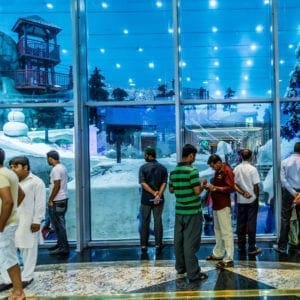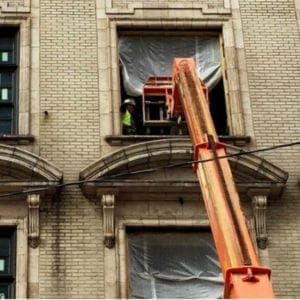 If ever there was someone with a natural flair for the hospitality industry, it is Robin Sheppard. He reached the rank of General Manager of Bodysgallen Hall by the tender age of 27, and has since gone on to co-found the Bespoke Hotels, which collectively manages over 9,500 hotel rooms across the globe.
If ever there was someone with a natural flair for the hospitality industry, it is Robin Sheppard. He reached the rank of General Manager of Bodysgallen Hall by the tender age of 27, and has since gone on to co-found the Bespoke Hotels, which collectively manages over 9,500 hotel rooms across the globe.
Robin’s zeal for genuine, welcoming hospitality, combined with his own experience with the debilitating Guillain Barre Syndrome, lead to a personal passion for promoting a positive approach to accessibility for people with disabilities in the hotel industry. Earlier this year he was chosen personally by the Minister for Disabled People, Work and Health, Penny Mordaunt, to be the Hotel Sector Champion for the Government’s Office for Disability Issues.
We chatted to Robin about the present, and future, of accessibility in the hospitality industry, and what hoteliers can do to ensure that all guests, regardless of disabilities, have excellent experiences.
Where did you begin in the hospitality industry?
I am a classically trained hotelier and have been in the hospitality industry for over 40 years now. By the age of 27, I had reached the position of General Manager of Bodysgallen Hall before moving on to hold similarly influential roles at several glamorous hotels including The Lygon Arms, The Royal Berkshire, and the Bath Spa.
What’s your role now?
I am the Chairman of Bespoke Hotels, a hotel management company that I co-founded with my business partner, Haydn Fentum in 2000.
Last year, World Tourism Day’s theme was ‘Tourism for All & Promoting Universal Accessibility’. Does this herald a new awareness in the industry?
Yes it does indeed & although the concept is still very new, it’s great to see it gain traction worldwide. There are still major strides that need to be taken and a lot of educating to do. The fact is that there is a big gap in the market currently for accessible travel, and hoteliers can really open up their markets by making even the smallest adjustments to what they already offer.
There is still a huge amount of room to grow and a lot more awareness that needs to be generated. This is very much seen as a niche in the industry rather than simply being part of regular hotels or establishments…
The Bespoke Access Awards were instituted to seek out and recognise design that improves hotel experiences for guests with disabilities. What was one of the most creative innovations that came out of the Bespoke Access Awards?
We were blown away by the innovation and creativity of hotel architects who entered the awards. All presentations were judged on the experience they provided for both disabled and able-bodied guests. One of the entries that definitely stood out for me was from Motionspot and Ryder Architects because they absolutely nailed the brief and exceeded our expectations in terms of the quality and attention to detail in their video and CGI artwork. Honourable mentions, though, must go to PH Partnership and Paul Cahillane who contributed mightily as well.
What are the biggest challenges for hotels to become more disability-friendly?
The DDA Compliance Act has raised the bar in terms of what is mandatory for hoteliers to put into their building. Our focus is on changing hearts and minds and not legislation, so the challenge is the speed of doing this and the fact that we only choose to use carrots without sticks.
How can the persistent ‘medicalisation’ of designs for disability be overcome?
By promoting competitions like the Bespoke Access Awards to encourage individuals, groups and design professionals of any age or background to showcase design ideas that are far-removed from a medical aesthetic. As a hospitality group, we look to create stylish yet practical access. ‘Medicalisation’ of designs for accessibility removes that personalisation and character we look for in our hotels: to craft a beautiful and accessible design for disability is to really understand the guest experience.
If a hotel wants to explore this new market, what steps should they take or what should they keep in mind?
I would probably recommend a day at NAIDEX which is the annual disability convention at the NEC to immerse yourself into the many splinter initiatives currently flourishing in the market place. However, there are many established practitioners ranging from DisabledGo to Blue Badge Style who can provide reference points and inspiration.
Is there any particular tech you have seen that is changing how hotels can be more disability friendly?
I have seen a number of apps which aim to make the experience easier for disabled people. None is yet fully proven and we wait to see which one wins the race.
By Megan Erasmus
 Megan Erasmus is the Marketing Manager for GuestRevu. GuestRevu was founded in 2012 as a result of a simple observation: The way people travel, book accommodation and engage with brands has transformed, but some hotels have not adapted. This led GuestRevu’s founder, Chris Alexandre, to begin building an easy-to-use and intuitive tool that could be used by hotels worldwide to manage their guest feedback more effectively in the digital age.
Megan Erasmus is the Marketing Manager for GuestRevu. GuestRevu was founded in 2012 as a result of a simple observation: The way people travel, book accommodation and engage with brands has transformed, but some hotels have not adapted. This led GuestRevu’s founder, Chris Alexandre, to begin building an easy-to-use and intuitive tool that could be used by hotels worldwide to manage their guest feedback more effectively in the digital age.
Want to keep up to date with industry news? Click here to subscribe toeHotelier’s daily e-newsletter.
















